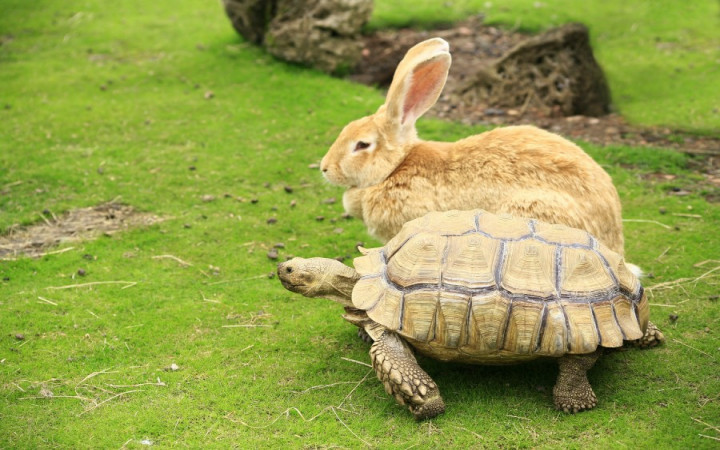Did you love to read Aesop's Fables when you were younger? Many kids learning to read love those classic stories that stick with you all your life. The lessons they teach somehow just seem to grow in wisdom and importance as you get older.
For example, you're probably familiar with the story of the tortoise and the hare. In a nutshell, a boastful hare brags about his speed to a slow-moving tortoise. Tired of hearing the hare brag, the tortoise challenges him to a race. After a predictably quick start, the hare decides to take a nap midway through the race, since he's confident he'll win. However, he awakens to learn that the tortoise, crawling slowly but steadily, has won the race.
This story has been used to teach at least a couple of important lessons. One is about avoiding the dangers of overconfidence. The other goes something along the lines of "slow and steady wins the race."
So which animal are you? The tortoise or the hare? Do you rush around seeking to do things as quickly as possible? Or do you tackle your work at a slow, but steady pace? Whether you approach life like the tortoise or the hare can make a difference in the outcomes you'll see.
For example, some will say that you should avoid being like the hare. After all, he was overconfident and ultimately lost the race, right? Moreover, you may have heard teachers say from time to time that "haste makes waste." But what does that mean?
The old adage that "great haste makes great waste" is usually attributed to Benjamin Franklin. Most people interpret it to mean that the faster you do something, the more likely it is that you'll make mistakes.
Many teachers want you to approach your schoolwork thoughtfully and thoroughly. When you rush through your work just to get it done as quickly as possible, you often make silly mistakes that could've been avoided with a little more time and thought.
But does haste always make waste? Not necessarily! Some people are able to work quickly and efficiently while also maintaining a high level of quality in all that they do. Recent research by Vanderbilt University professors, however, lends some credence to the notion of haste making waste.
Researchers found that the brain switches into a special mode when forced to make rapid decisions. Overall, there appears to be a tradeoff between speed and accuracy. As the brain makes decisions more quickly, those decisions are usually based upon less information, which often leads to a greater likelihood of mistakes.
When you approach things like the tortoise, you methodically and steadily work toward your goal. You might not arrive there first, but then again you might! In any case, you're likely to make fewer mistakes and you might just enjoy the journey more than the hare.
According to author Greg Anderson, you should "[f]ocus on the journey, not the destination. Joy is found not in finishing an activity but in doing it." If you look at life like a race, it's not the finish line that stands out. Instead, it's all the time you spent getting there that really matters.
Goals are great to seek, but often the milestones and achievements aren't what we remember. In the end, the most memorable and important parts of our lives are the journeys we went on, not the destinations we reached. So be the hare when you have to, but always remember that the slow and steady journey is what you'll remember and treasure the most.




